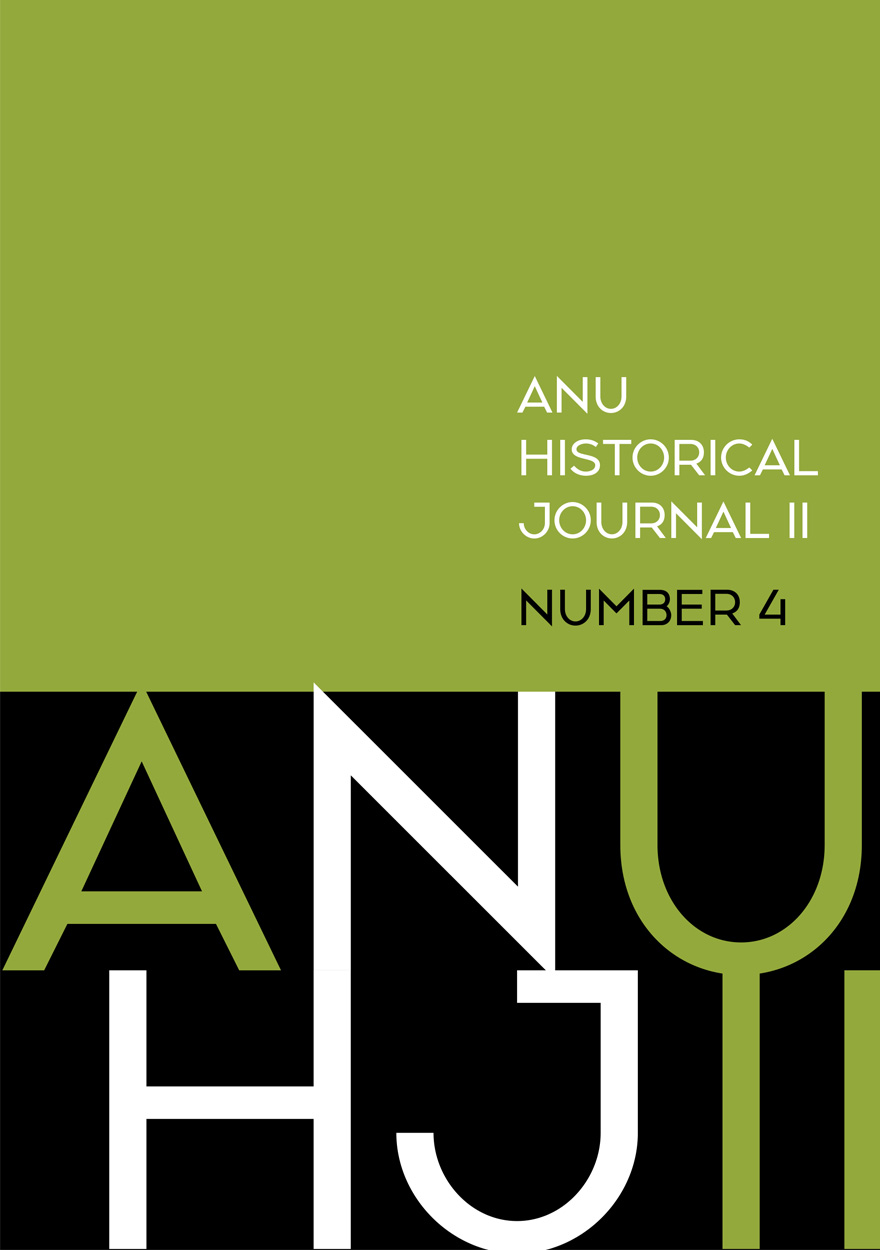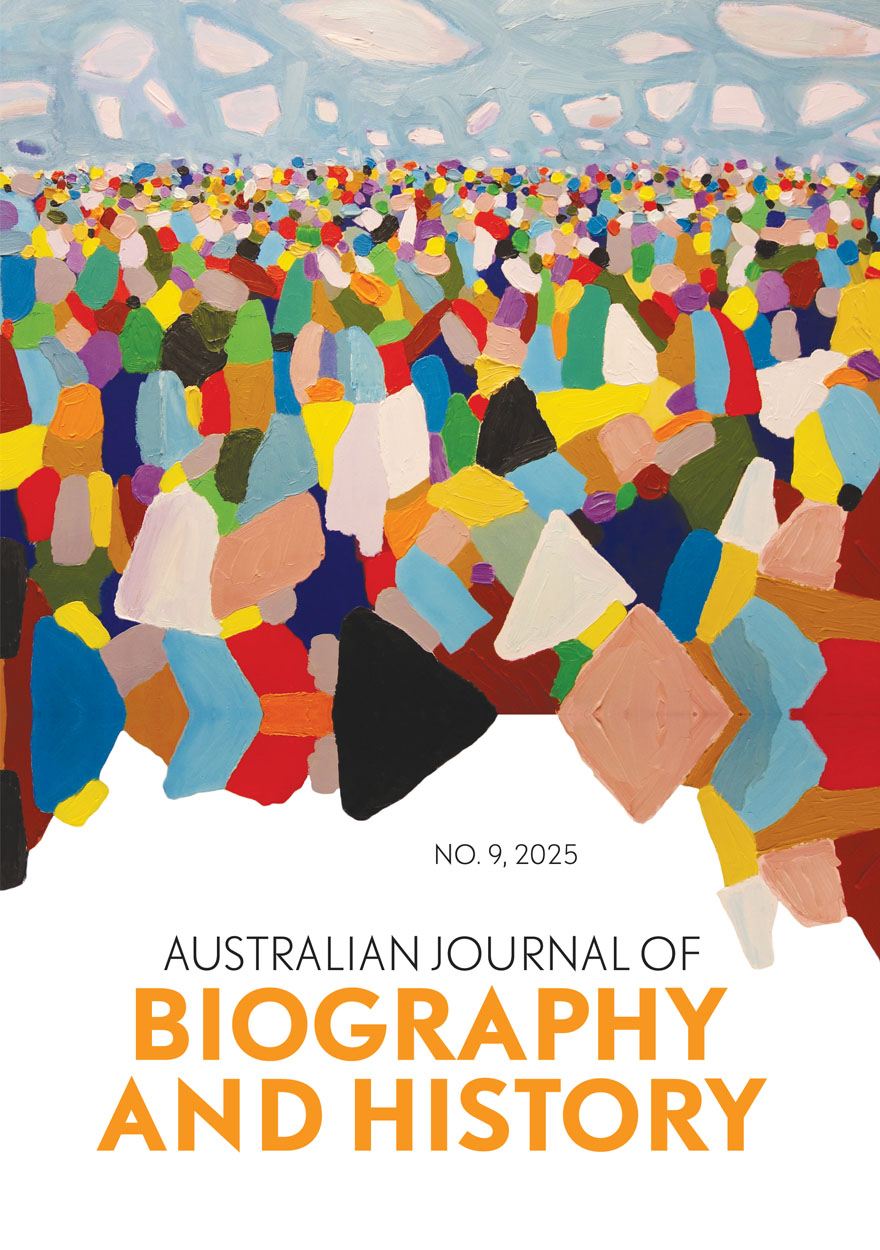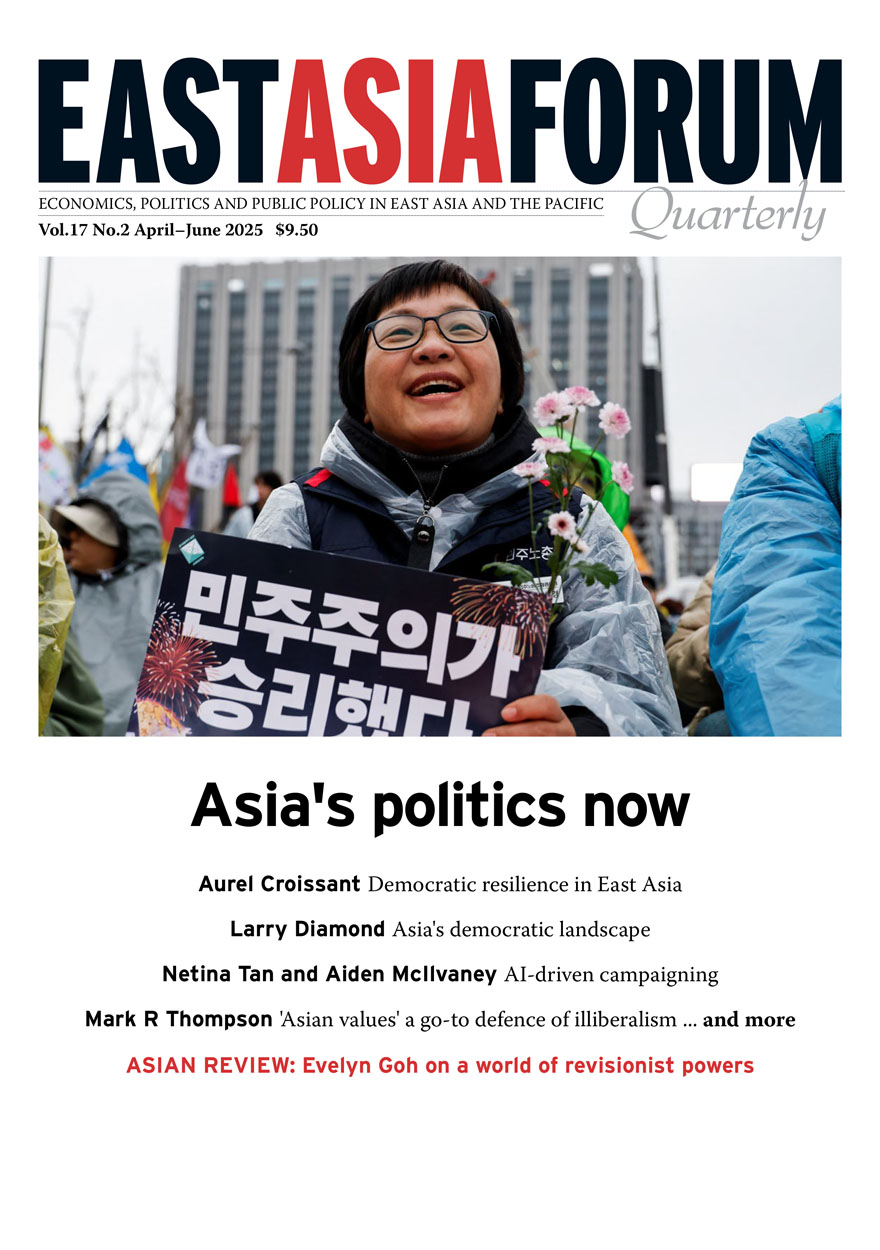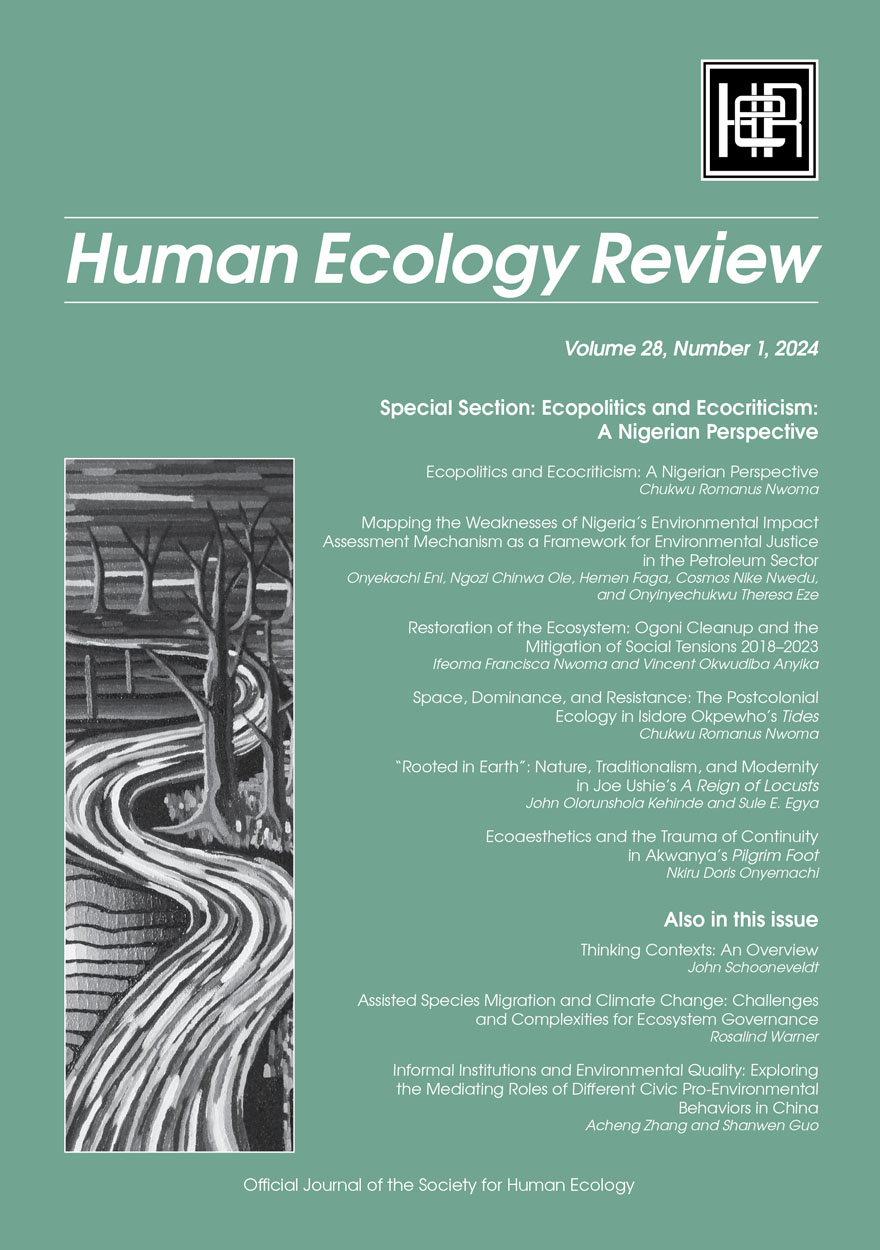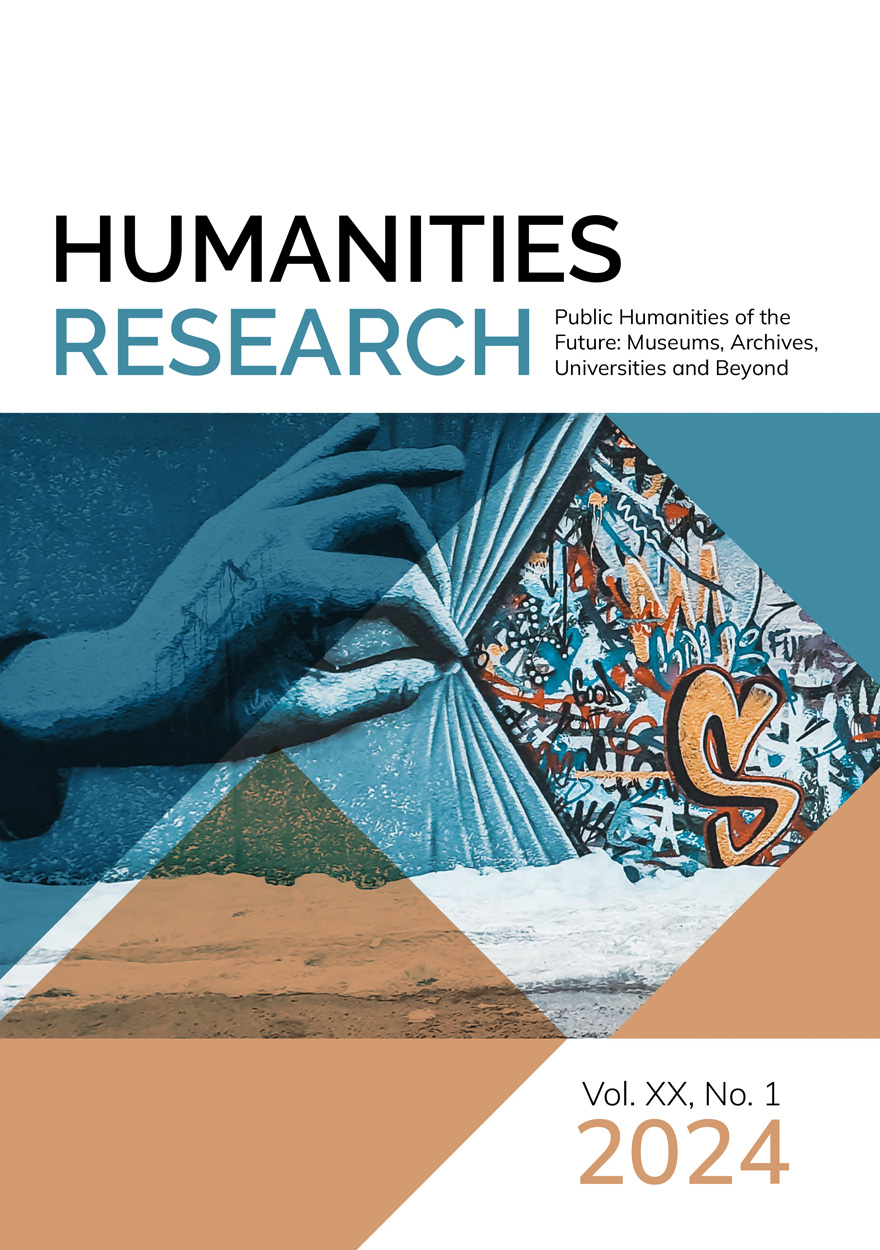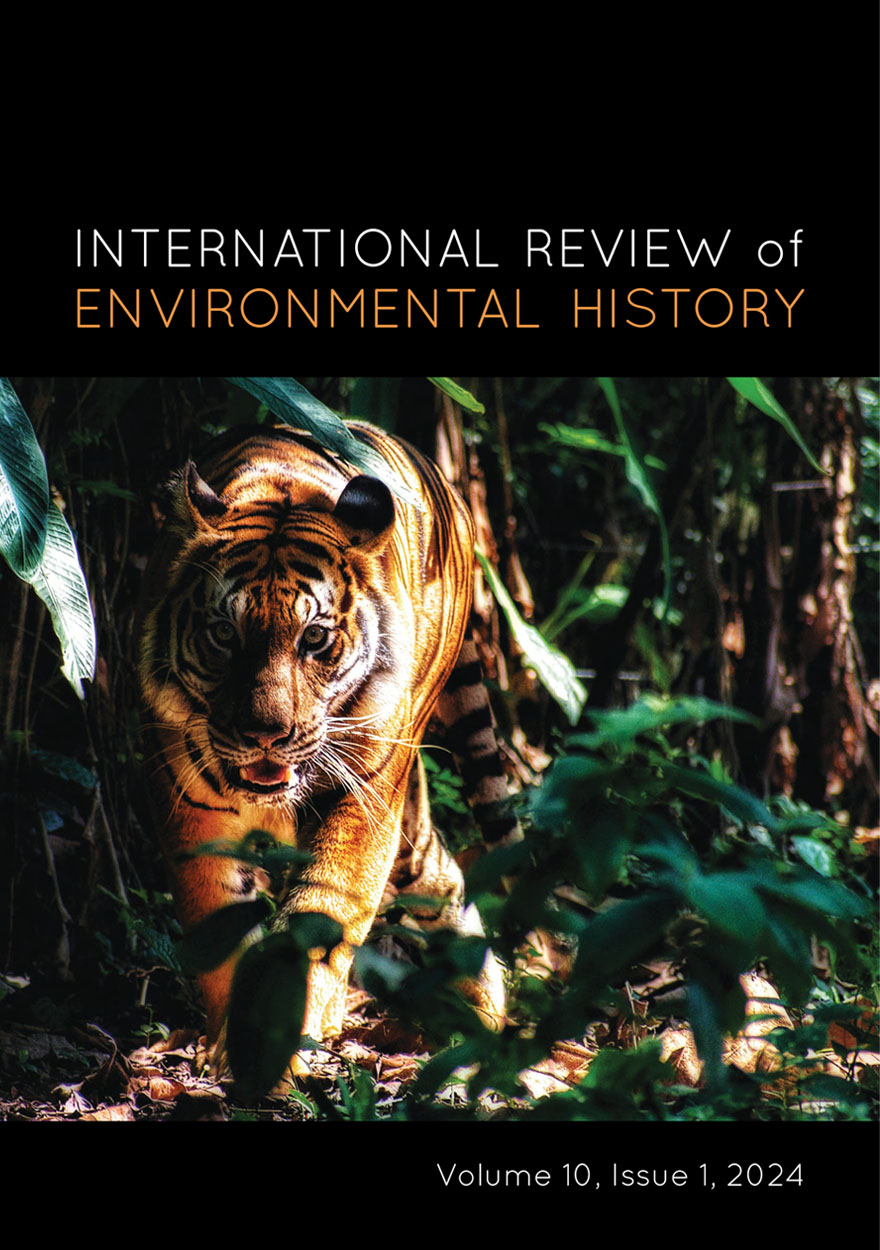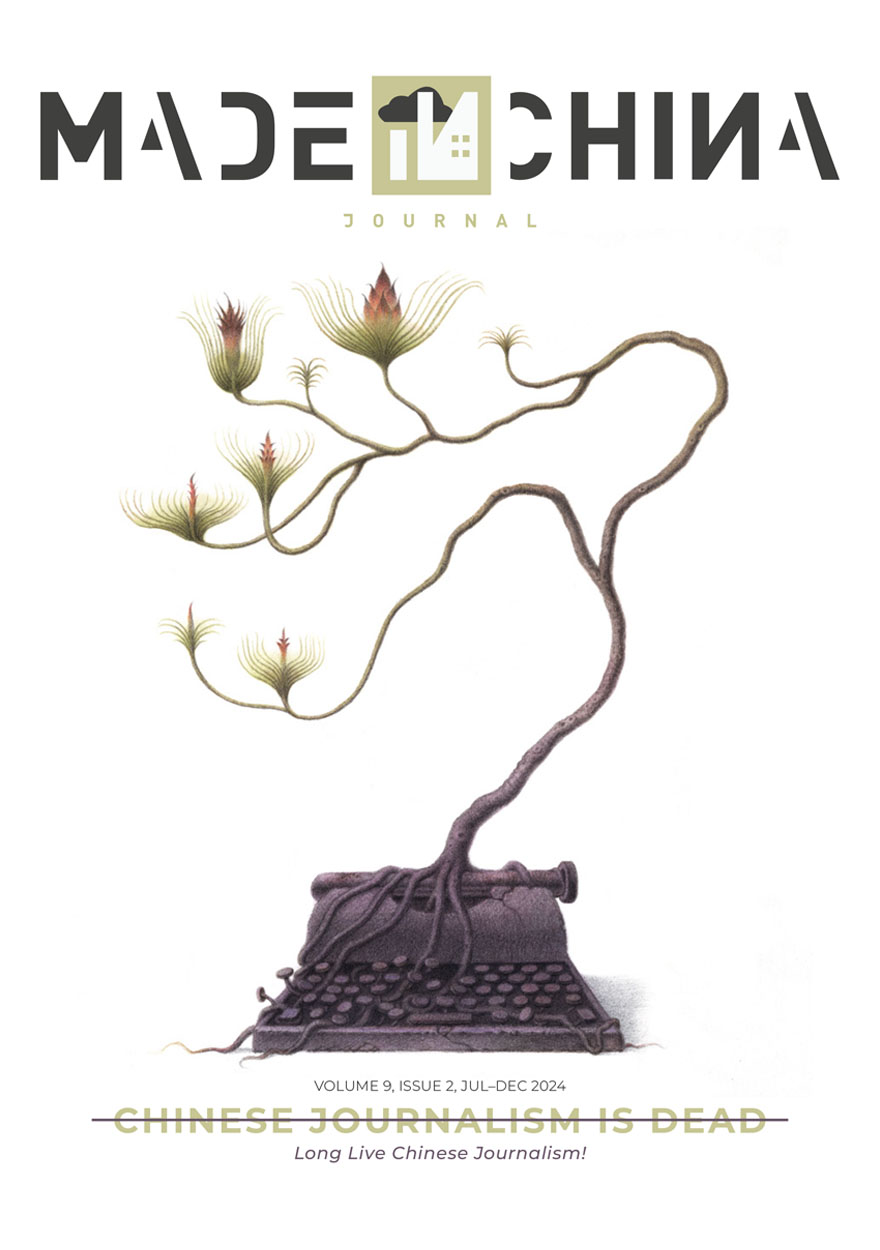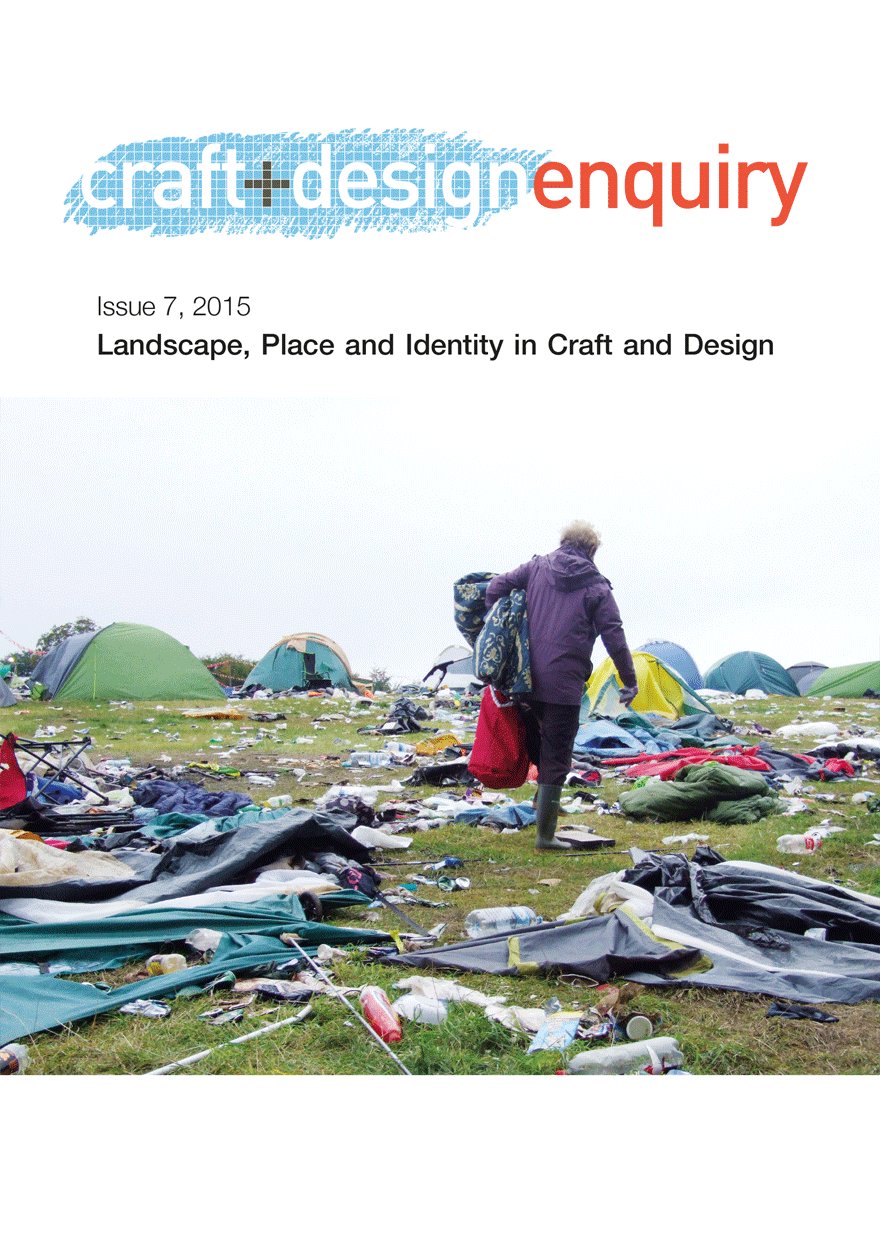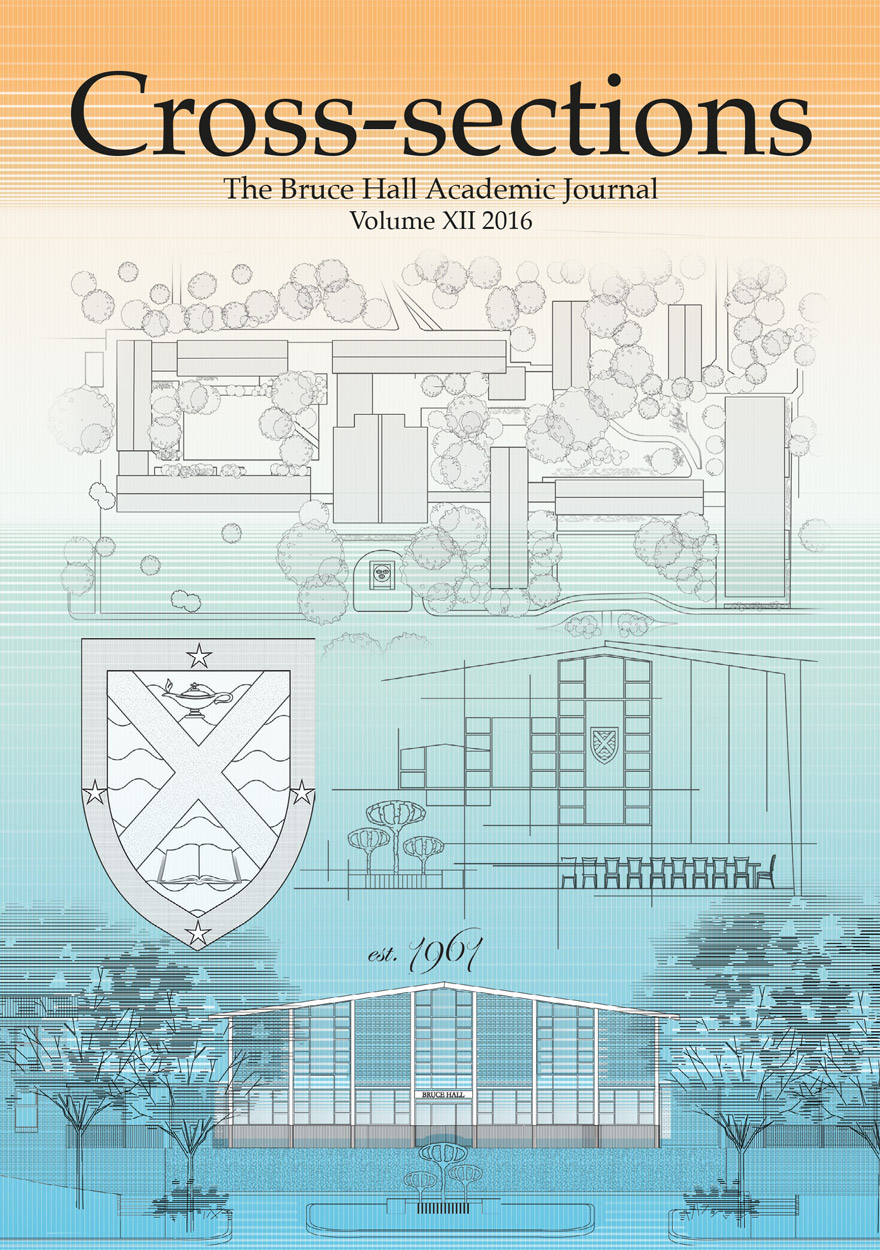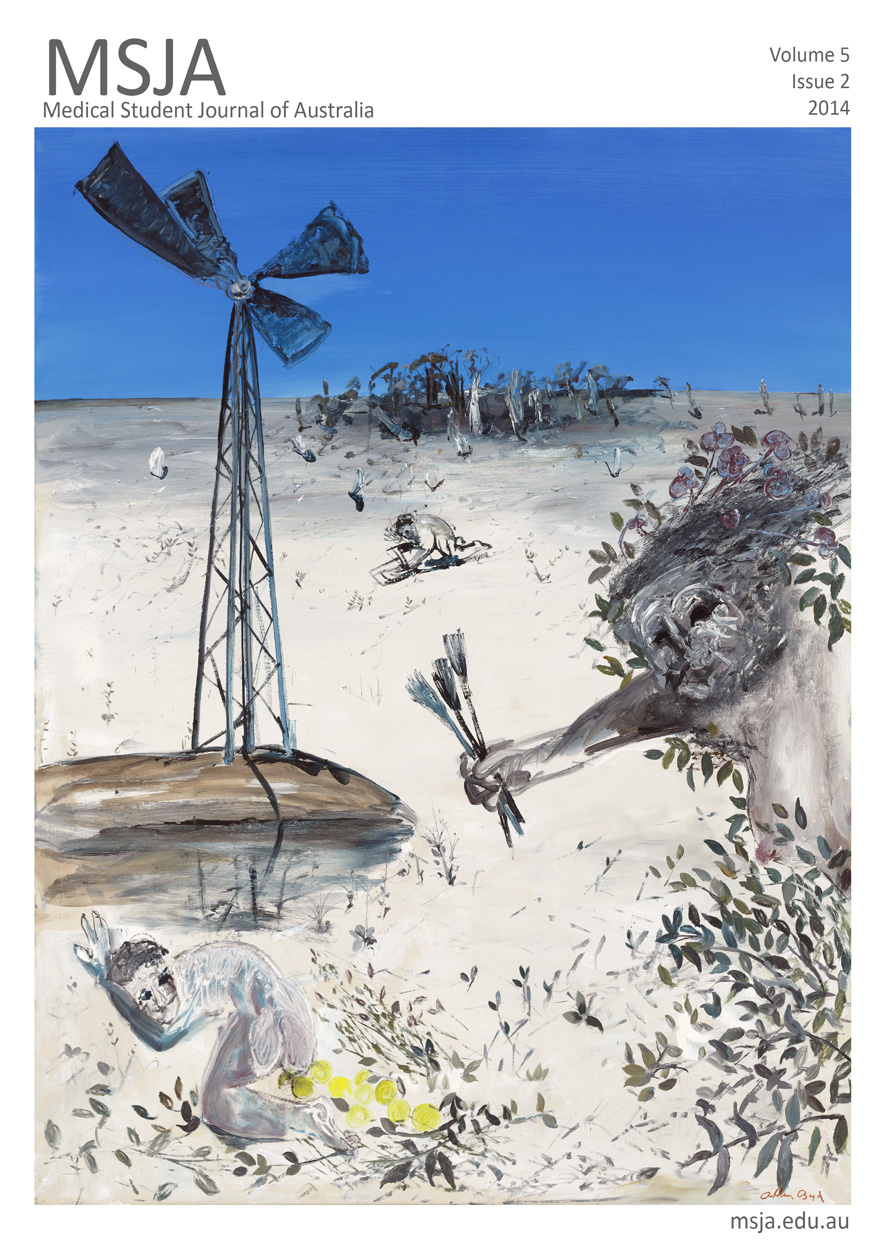Journals
Browse or search a variety of academic journals maintained by ANU Press, or find out more about the journal authors. Download the book for free or buy a print-on-demand copy.
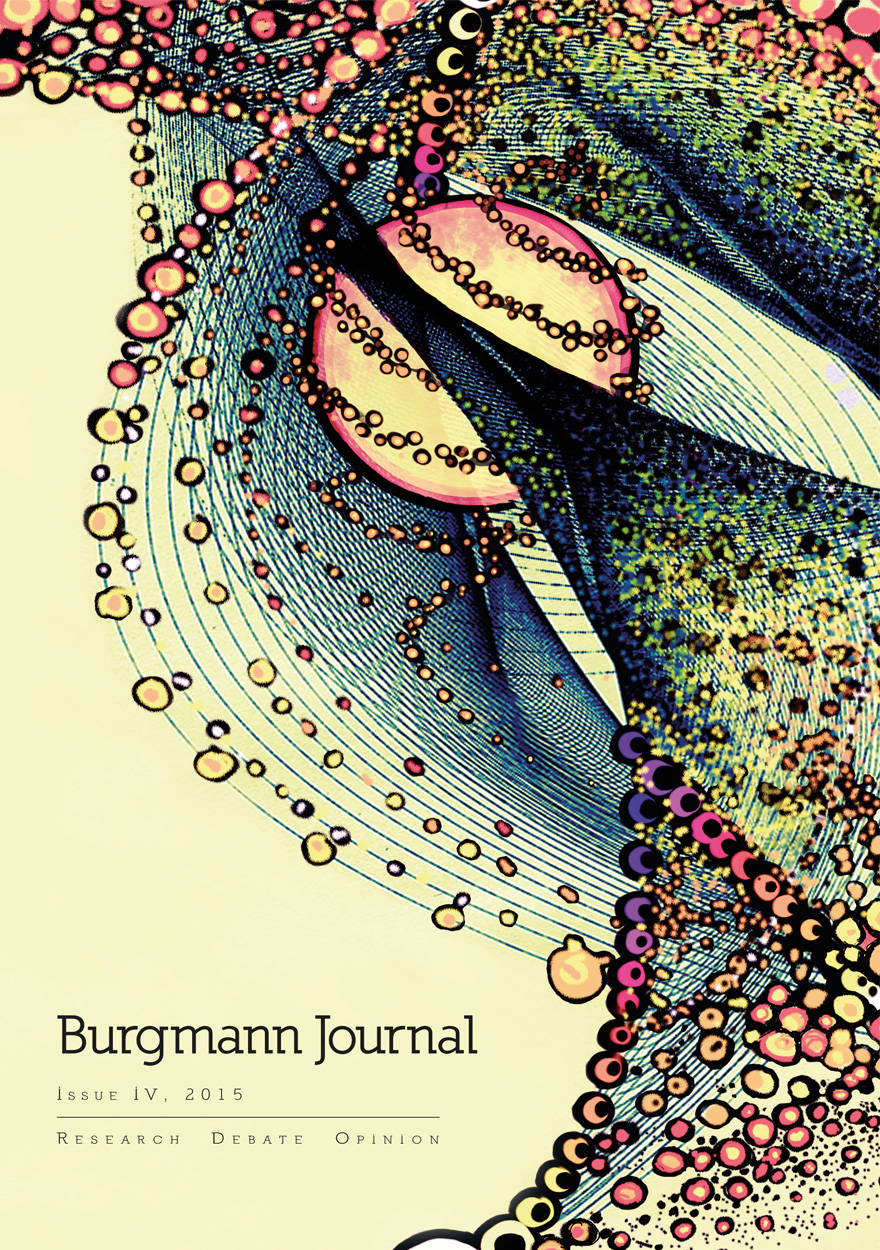
Burgmann Journal- Research Debate Opinion: Issue 4, 2015 »
Publication date: December 2015
Burgmann Journal is an interdisciplinary, peer-reviewed publication of collected works of research, debate and opinion from residents and alumni of Burgmann College designed to engage and stimulate the wider community.
Download for free
Not available for purchase
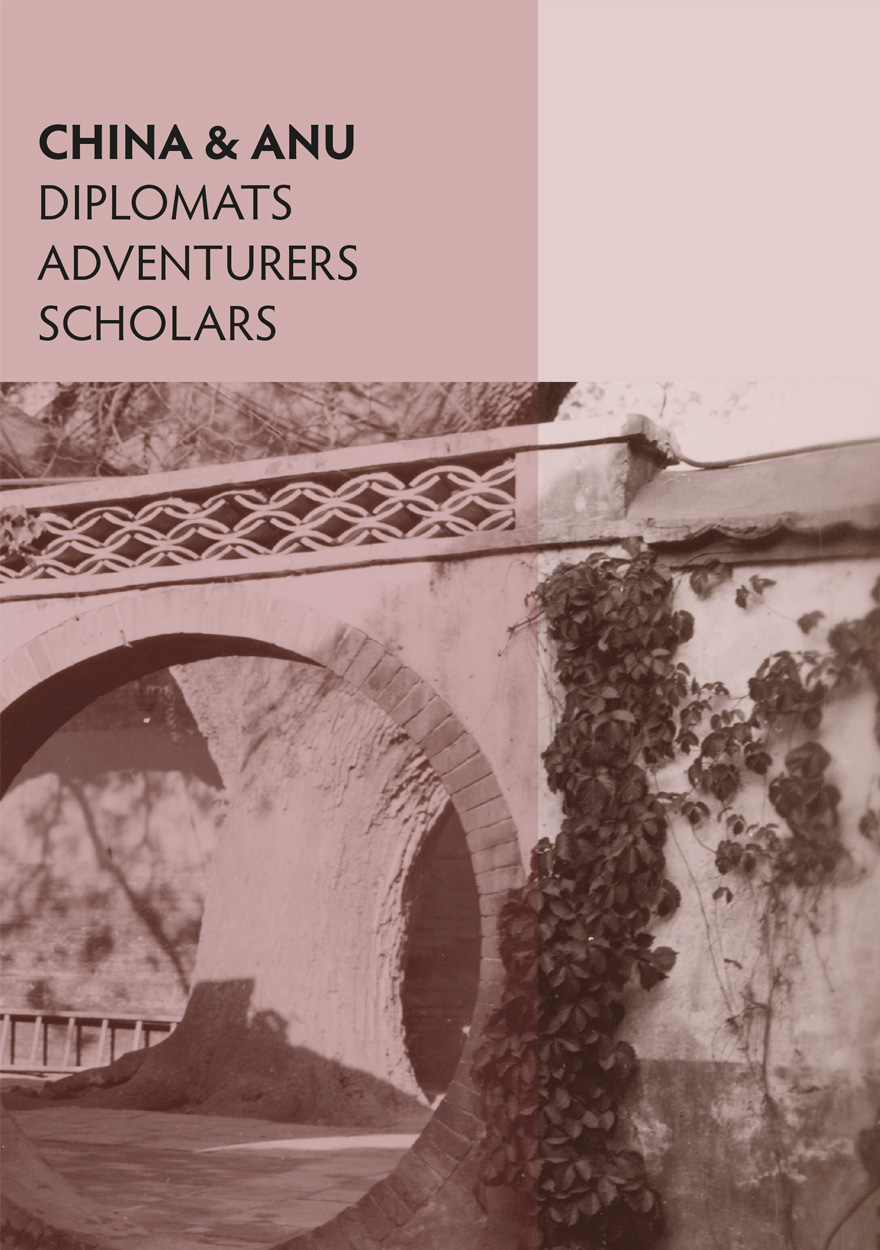
China & ANU »
Diplomats, adventurers, scholars
Authored by: William Sima
Publication date: December 2015
The Pacific War and its aftermath radically transformed Australian perceptions of what was then called the ‘Near North’. Many recognised that in the postwar world Australia’s strategic interests and economic fortunes called for a new understanding of Asia and the Pacific. China loomed large in these calculations.
Based on extensive research and featuring rare archival documents and photographs, China & ANU introduces the diplomats, adventurers and scholars who contributed to Australia’s engagement with China, the ‘Chinese Commonwealth’ and our region from the 1940s-1950s. In particular, this book focusses on the interconnection between Australia’s first diplomat-scholars in China and the founding of Chinese Studies at the newly established Australian National University.
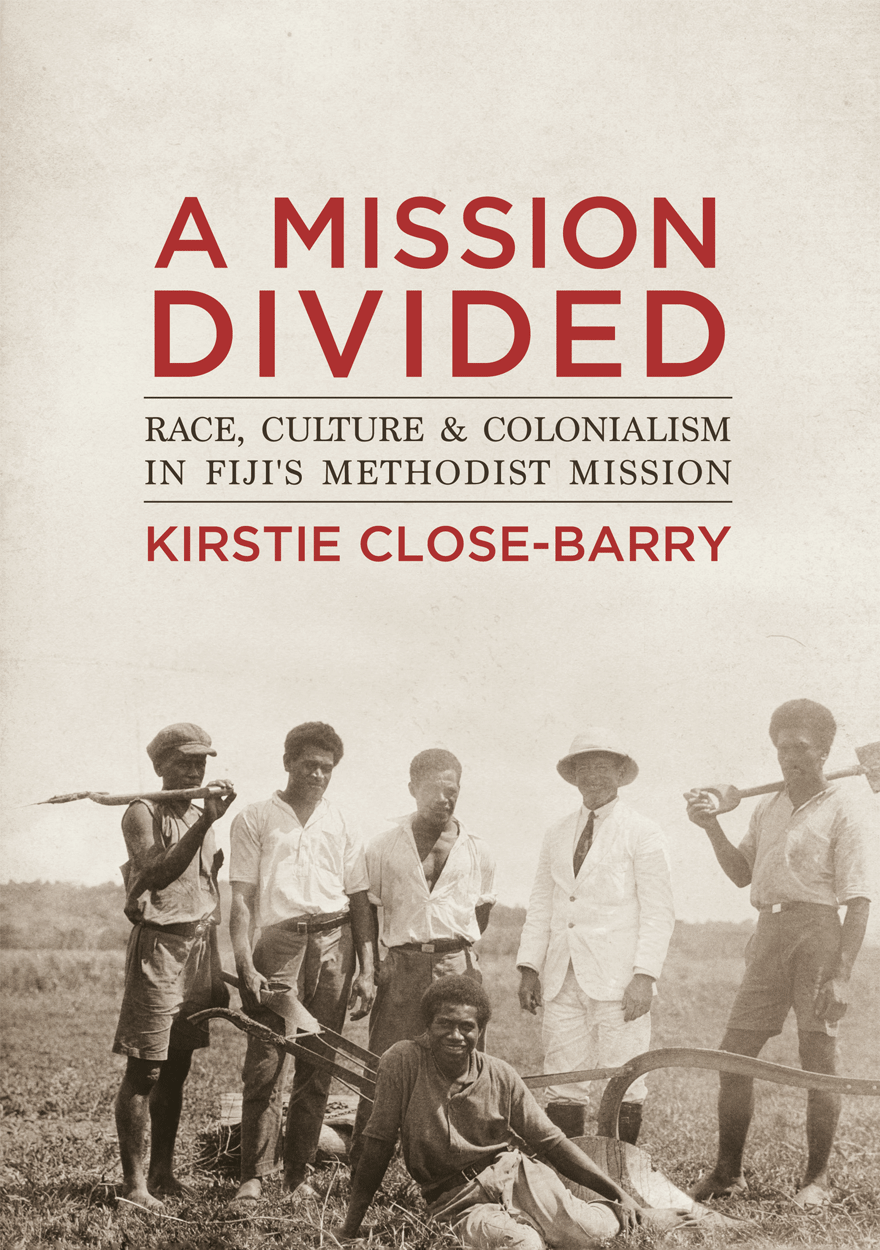
A Mission Divided »
Race, Culture and Colonialism in Fiji’s Methodist Mission
Authored by: Dr Kirstie Close-Barry
Publication date: December 2015
This book provides insight into the long process of decolonisation within the Methodist Overseas Missions of Australasia, a colonial institution that operated in the British colony of Fiji. The mission was a site of work for Europeans, Fijians and Indo-Fijians, but each community operated separately, as the mission was divided along ethnic lines in 1901. This book outlines the colonial concepts of race and culture, as well as antagonism over land and labour, that were used to justify this separation. Recounting the stories told by the mission’s leadership, including missionaries and ministers, to its grassroots membership, this book draws on archival and ethnographic research to reveal the emergence of ethno-nationalisms in Fiji, the legacies of which are still being managed in the post-colonial state today.
Analysing in part the story of her own ancestors, Kirstie Barry develops a fascinating account of the relationship between Christian proselytization and Pacific nationalism, showing how missionaries reinforced racial divisions between Fijian and Indo-Fijian even as they deplored them. Negotiating the intersections between evangelisation, anthropology and colonial governance, this is a book with resonance well beyond its Fijian setting.
– Professor Alan Lester, University of Sussex
This thoroughly researched and finely crafted book unwraps and finely illustrates the interwoven layers of evolving complexity in different interpretations of ideals and debates on race, culture, colonialism and independence that informed the way the Methodist Mission was run in Fiji. It describes the human personalities and practicalities, interconnected at local, regional and global levels, which influenced the shaping of the Mission and the independent Methodist Church in Fiji. It documents the influence of evolving anthropological theories and ecumenical theological understandings of culture on mission practice. The book’s rich sources enhance our understanding of the complex history of ethnic relations in Fiji, helping to explain why ethnic divisive thinking remains a challenge.
– Jacqueline Ryle, University of the South Pacific
A beautifully researched study of the transnational impact of South Asian bodies on nationalisms and church devolution in Fiji, and an important resource for empire studies as a whole.’
– Professor Jane Samson, University of Alberta, Canada

Through a Glass Darkly »
The Social Sciences Look at the Neoliberal University
Edited by: Margaret Thornton
Publication date: November 2015
This collection of essays arose from a workshop held in Canberra in 2013 under the auspices of the Academy of Social Sciences in Australia to consider the impact of the encroachment of the market on public universities. While the UK tripled fees in 2013 and determined that the teaching of the social sciences and the humanities would no longer be publicly funded, it was feared that Australia would go further and deregulate fees altogether.
In the best tradition of the social sciences, the contributors have assumed the role of critic and conscience of society to present penetrating analyses of the ramifications of the corporatisation of the university as neoliberalism continues to occupy the ascendant position in the political firmament. The dramatis personae in these analyses are students, academics, managers and political mandarins with the gendered character of corporatisation an important sub-theme.

Journeys into the Rainforest »
Archaeology of Culture Change and Continuity on the Evelyn Tableland, North Queensland
Authored by: Åsa Ferrier
Publication date: November 2015
This monograph presents the results of archaeological research that takes a longitudinal approach to interpreting and understanding Aboriginal–European contact. It focuses on a small but unique area of tropical rainforest in far north Queensland’s Wet Tropics Bioregion, located within the traditional lands of the JirrbalAboriginal people on the Evelyn Tableland. The research integrates a diverse range of data sources: archaeological evidence recovered from Aboriginal open sites occupied in the pre- to post-contact periods, historical documents of early ethnographers, settlers and explorers in the region, supplemented with Aboriginal oral history testimony. Analyses of the archaeological evidence excavated from three open sites facilitated the identification of the trajectories of culture change and continuity that this investigation focused on: Aboriginal rainforest material culture and technology, plant subsistence strategies, and rainforest settlement patterns.
Analyses of the data sets demonstrate that initial use of the rainforest environment on the Evelyn Tableland occurred during the early Holocene period, with successful adaptation and a change towards more permanent Aboriginal use of the rainforest becoming established in the late Holocene period. European arrival and settlement on traditional Aboriginal land resulted in a period of historical upheaval for the Aboriginal rainforest people. Following an initial period of violent interactions and strong Aboriginal resistance from the rainforest, Jirrbal Aboriginal people continued to adapt and transform their traditional culture to accommodate for the many changes forced upon them throughout the post‑contact period.
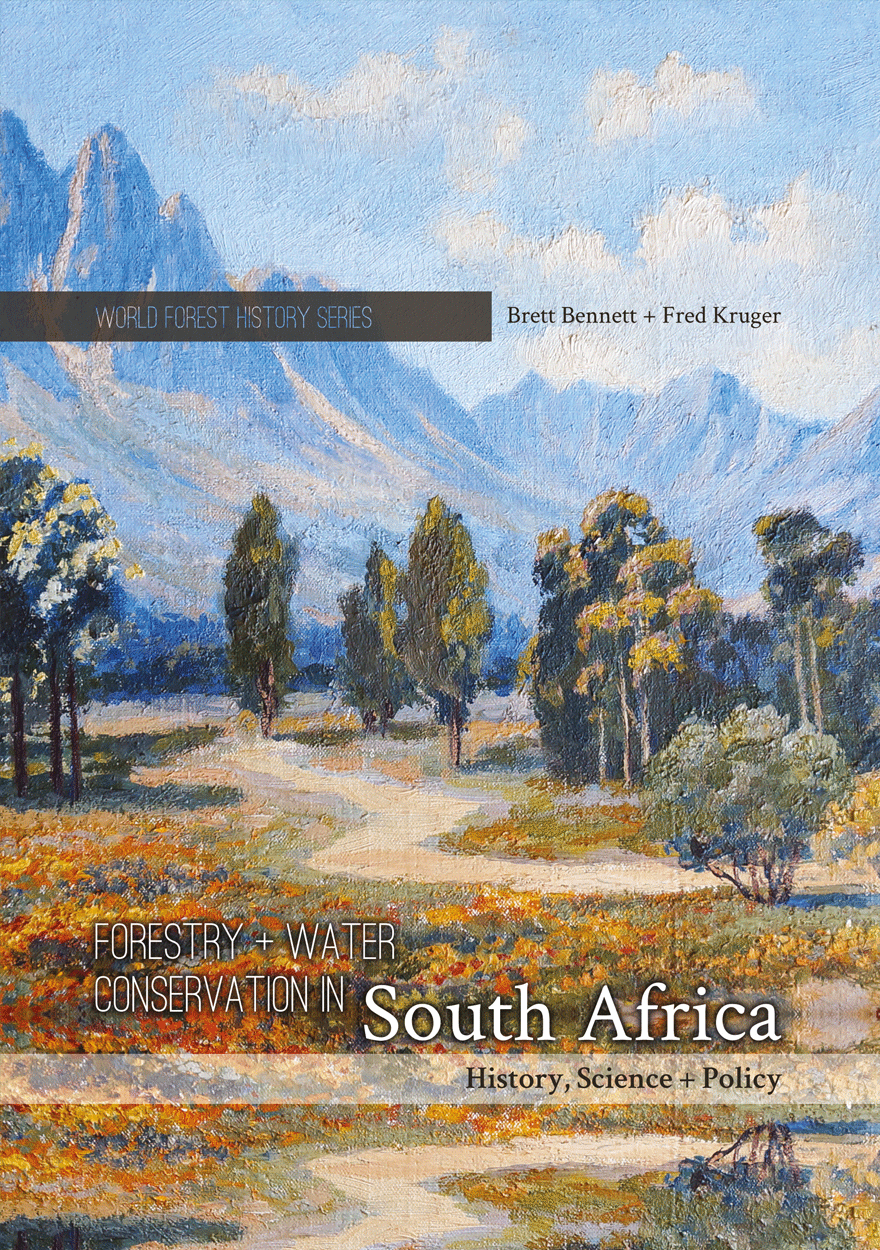
Forestry and Water Conservation in South Africa »
History, Science and Policy
Authored by: Brett Bennett, Fred Kruger
Publication date: November 2015
This innovative interdisciplinary study focuses on the history, science, and policy of tree planting and water conservation in South Africa. South Africa’s forestry sector has sat—often controversially—at the crossroads of policy and scientific debates regarding water conservation, economic development, and biodiversity protection. Bennett and Kruger show how debates about the hydrological impact of exotic tree planting in South Africa shaped the development of modern scientific ideas and state policies relating to timber plantations, water conservation, invasive species control, and biodiversity management within South Africa as well as elsewhere in the world. Forestry and Water Conservation in South Africa shows how scientific research on the impact of exotic and native vegetation led to the development of a comprehensive national policy for conserving water, producing timber, and protecting indigenous species from invasive alien plants. Policies and laws relating to forests and water began to change in the late 1980s and early 1990s as a result of political and administrative changes within South Africa. This book suggests that the country’s contemporary policies towards timber plantations, guided by the National Water Act of 1998, need to be reconsidered in light of the authors’ findings. Bennett and Kruger also call for more interdisciplinary research and greater emphasis on integrated policies and management plans for forestry, invasive alien plants, water conservation, and biodiversity preservation.

Maudu' »
A Way of Union with God
Authored by: Muhammad Adlin Sila
Publication date: November 2015
This volume offers a fascinating case study of the Sayyid community of Cikoang in South Sulawesi – in particular, an examination of the role of the descendants of Sayyid Jalaluddin al-‘Aidid, a Hadhrami merchant-teacher of great authority and charisma who is said to have initially settled in Gowa in the 17th century. It is of particular interest because the migration of Sayydid Jalaluddin occurred well before the major Hadhrami diaspora to Southeast Asia in the mid-19th century. Of particular interest is the way Sayyid Jalaluddin and his descendants became integrated within the Makassar community.
Sayyid Jalaluddin’s legacy to the Cikoang community is the Tarekat Bahr ul-Nur, whose mystic teachings expound the creation of the world from the ‘Nur Muhammad’. A consequence of this teaching is an enormous emphasis on the celebration of Maudu’ (Maulid or the Birth of the Prophet) as expressed in the local assertion: ‘My existence on this earth is for nothing but Maudu’.’ Every year this prompts the Cikoang community to hold one of the most elaborate and colourful Maulid celebrations in Indonesia.
This study was originally submitted as an MA thesis at ANU in 1998, but soon became recognised as an important contribution to Hadhrami studies. Its author, M. Adlin Sila, has since gone on to complete his PhD at ANU, Being Muslim in Bima of Sumbawa, Indonesia: Practice, Politics and Cultural Diversity. This study of Bima and its religious history establishes him as a major researcher on the diverse traditions of Islam in eastern Indonesia.
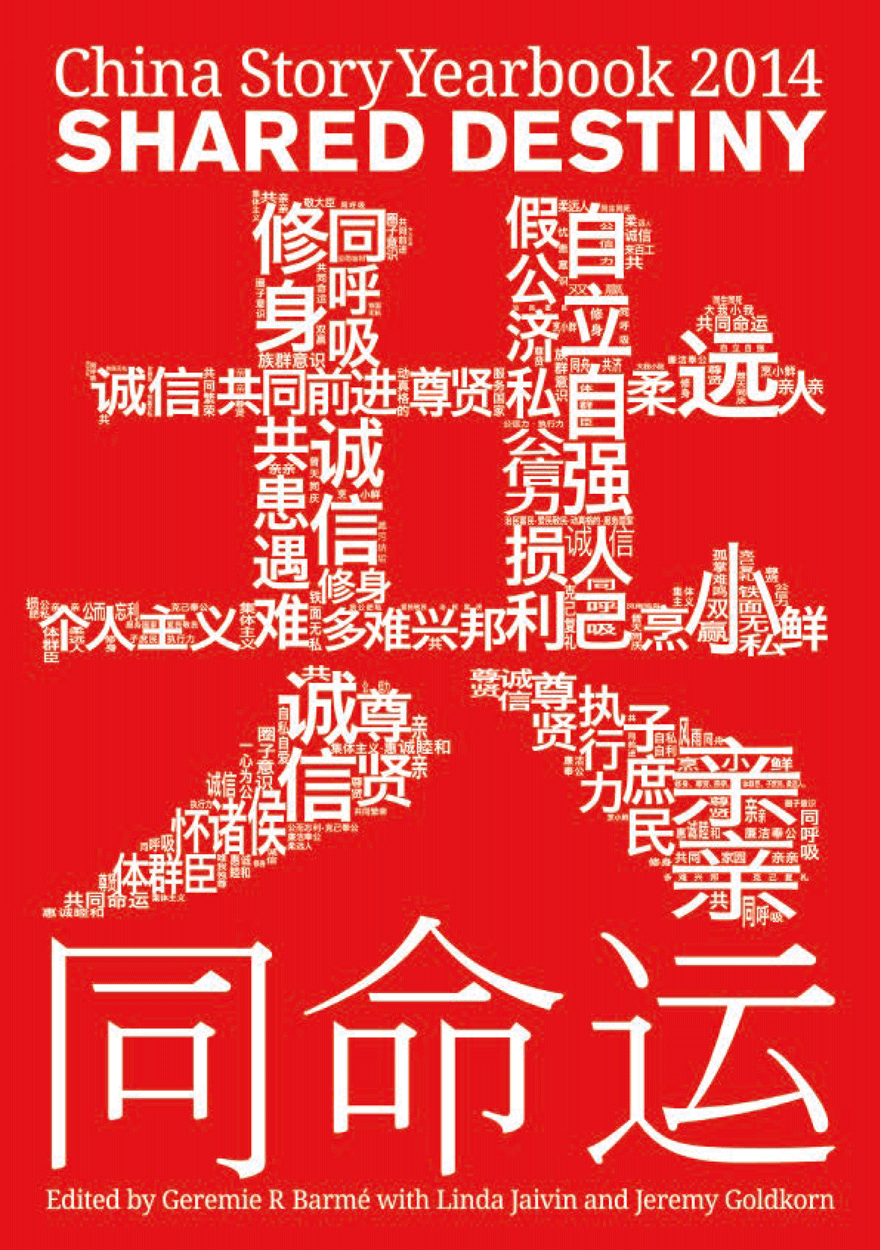
Shared Destiny »
Publication date: November 2015
Humanity as never before shares a common destiny, whether it be in terms of the resources of the planet, the global environment, economic integration, or the movement of peoples, ideas, cultures. For better or worse humankind is a Community of Shared Destiny 命运共同体.
The People’s Republic of China under the leadership of the Chinese Communist Party and its ‘Chairman of Everything’, Xi Jinping, has declared that it shares in the destiny of the countries of the Asia and Pacific region, as well as of nations that are part of an intertwined national self-interest. The Party, according to Marxist-Leninist-Maoist theory, is the vanguard of progressive social forces; it cleaves to the concept of shared destiny and its historical role in shaping that destiny. Since its early days nearly a century ago it has emphasised the collective over the individual, the end rather than the means. It addresses majority opinion while guiding and moulding the agenda both for today, and for the future.
Chapter notes are available to view online.
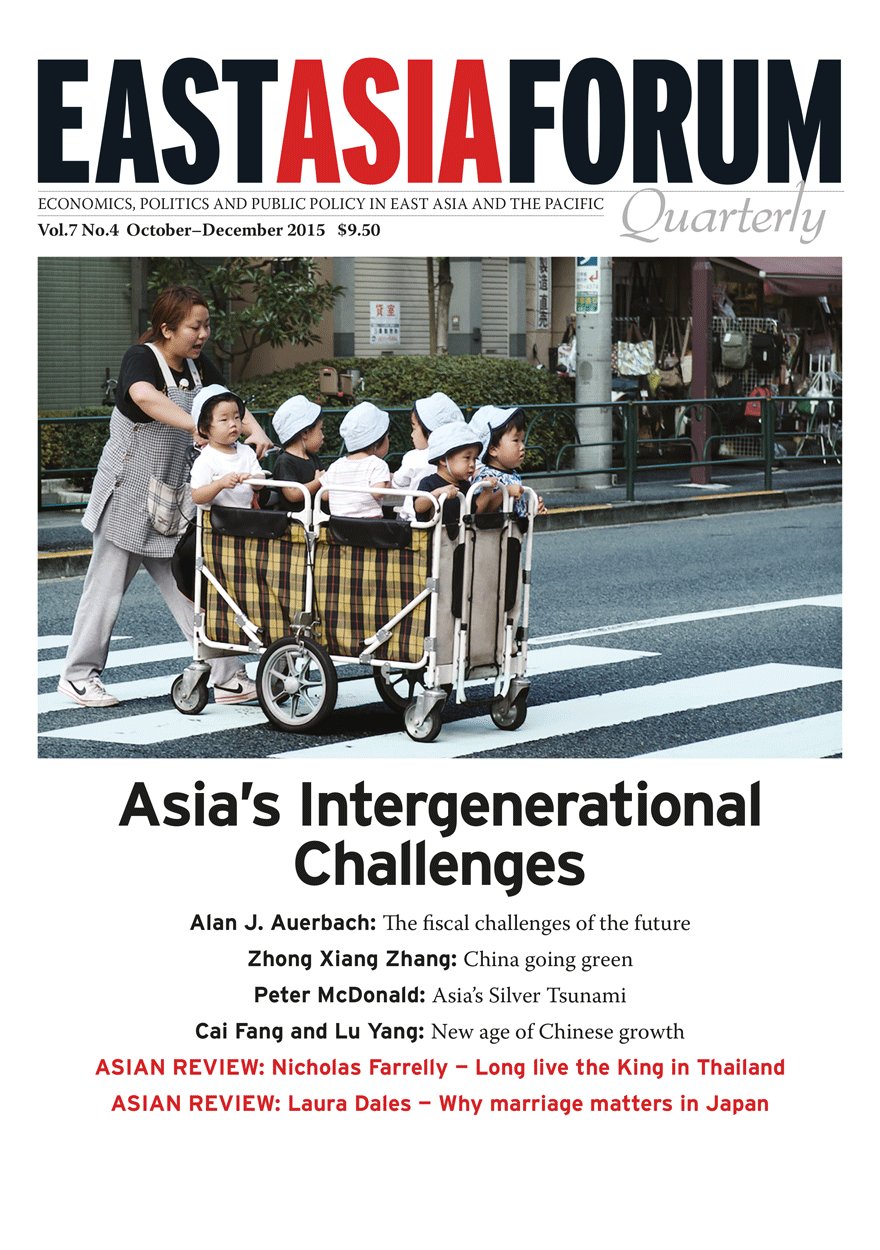
East Asia Forum Quarterly: Volume 7, Number 4, 2015 »
Publication date: November 2015
East Asia Forum Quarterly grew out of East Asia Forum (EAF) online, which has developed a reputation for providing a platform for the best in Asian analysis, research and policy comment on the Asia Pacific region in world affairs. EAFQ aims to provide a further window onto research in the leading research institutes in Asia and to provide expert comment on current developments within the region. The East Asia Forum Quarterly, like East Asia Forum online, is an initiative of the East Asia Forum (EAF) and its host organisation, the East Asian Bureau of Economic Research (EABER) in the Crawford School of Economics and Government in the College of Asia & the Pacific at The Australian National University.
Download for free
Not available for purchase

The First Fleet Piano: Volume Two Appendices »
A Musician’s View
Authored by: Geoffrey Lancaster
Publication date: November 2015
During the late eighteenth century, a musical–cultural phenomenon swept the globe. The English square piano—invented in the early 1760s by an entrepreneurial German guitar maker in London—not only became an indispensable part of social life, but also inspired the creation of an expressive and scintillating repertoire. Square pianos reinforced music as life’s counterpoint, and were played by royalty, by musicians of the highest calibre and by aspiring amateurs alike.
On Sunday, 13 May 1787, a square piano departed from Portsmouth on board the Sirius, the flagship of the First Fleet, bound for Botany Bay. Who made the First Fleet piano, and when was it made? Who owned it? Who played it, and who listened? What music did the instrument sound out, and within what contexts was its voice heard? What became of the First Fleet piano after its arrival on antipodean soil, and who played a part in the instrument’s subsequent history? Two extant instruments contend for the title ‘First Fleet piano’; which of these made the epic journey to Botany Bay in 1787–88?
The First Fleet Piano: A Musician’s View answers these questions, and provides tantalising glimpses of social and cultural life both in Georgian England and in the early colony at Sydney Cove. The First Fleet piano is placed within the musical and social contexts for which it was created, and narratives of the individuals whose lives have been touched by the instrument are woven together into an account of the First Fleet piano’s conjunction with the forces of history.
View ‘The First Fleet Piano: Volume One’.

The First Fleet Piano: Volume One »
A Musician’s View
Authored by: Geoffrey Lancaster
Publication date: November 2015
During the late eighteenth century, a musical–cultural phenomenon swept the globe. The English square piano—invented in the early 1760s by an entrepreneurial German guitar maker in London—not only became an indispensable part of social life, but also inspired the creation of an expressive and scintillating repertoire. Square pianos reinforced music as life’s counterpoint, and were played by royalty, by musicians of the highest calibre and by aspiring amateurs alike.
On Sunday, 13 May 1787, a square piano departed from Portsmouth on board the Sirius, the flagship of the First Fleet, bound for Botany Bay. Who made the First Fleet piano, and when was it made? Who owned it? Who played it, and who listened? What music did the instrument sound out, and within what contexts was its voice heard? What became of the First Fleet piano after its arrival on antipodean soil, and who played a part in the instrument’s subsequent history? Two extant instruments contend for the title ‘First Fleet piano’; which of these made the epic journey to Botany Bay in 1787–88?
The First Fleet Piano: A Musician’s View answers these questions, and provides tantalising glimpses of social and cultural life both in Georgian England and in the early colony at Sydney Cove. The First Fleet piano is placed within the musical and social contexts for which it was created, and narratives of the individuals whose lives have been touched by the instrument are woven together into an account of the First Fleet piano’s conjunction with the forces of history.
View ‘The First Fleet Piano: Volume Two Appendices’.

craft + design enquiry: issue 7, 2015 »
Landscape, Place and Identity in Craft and Design
Edited by: Kay Lawrence
Publication date: November 2015
craft + design enquiry is an open-access, peer-reviewed journal promoting and disseminating research excellence generated by and about the craft and design sector. craft + design enquiry investigates the contribution that contemporary craft and design makes to society, establishing a dialogue between craft and design practice and cultural, social and environmental concerns. It includes submissions from across the field of craft and design from artists and practitioners, curators, historians, art and cultural theorists, educationalists, museum professionals, philosophers, scientists and others with a stake in the future developments of craft and design.
Download for free
Not available for purchase

They Came to Murramarang »
A History of Murramarang, Kioloa and Bawley Point
Edited by: Sue Feary, Alastair Greig
Authored by: Bruce Hamon
Publication date: October 2015
Bruce Hamon’s They Came to Murramarang, first published in 1994, provides a unique combination of local history and personal recollections from a writer who witnessed the transformation of the Murramarang region from the timber era to modern times. This new edition retains the original character of Bruce’s engaging prose with additional chapters relating to Bruce’s life, the writing of the book, the Indigenous history of the region and the transformation of the area since the book was written. The book has also been enhanced by the insertion of additional photographs.
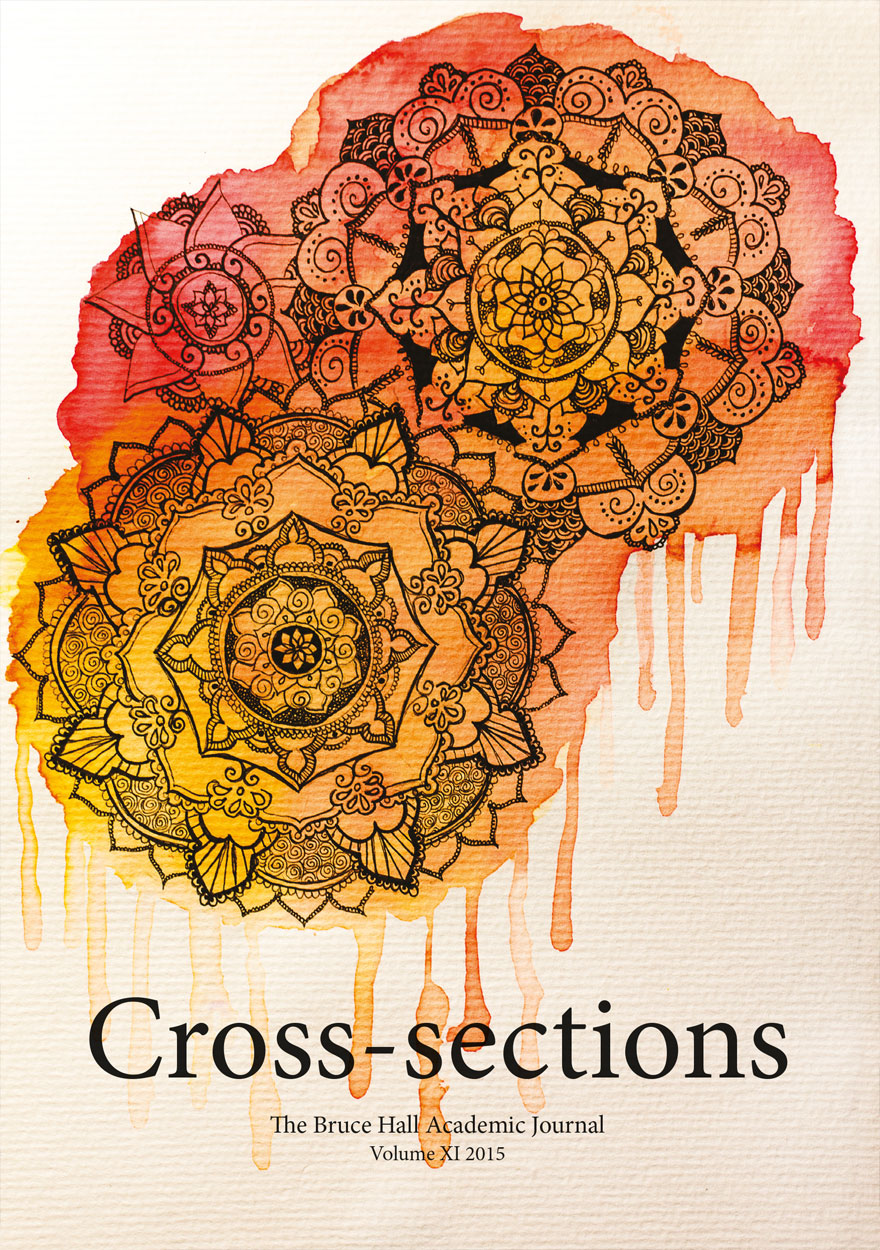
Cross-sections, The Bruce Hall Academic Journal: Volume XI, 2015 »
Publication date: October 2015
Representing the combined energies of a large group of authors, editors, artists and researchers associated with Bruce Hall at the ANU, Cross-sections collects a range of works (from academic articles and essays to photography, digital art and installation artwork) that represents the disciplinary breadth and artistic vitality of the ANU.
Presenting a challenging and absorbing way for students to hone vital research skills, in the process, Cross-sections nurtures a fruitful environment of collaborative interaction between academics and students.
Download for free
Not available for purchase

Managing Under Austerity, Delivering Under Pressure »
Performance and Productivity in Public Service
Edited by: John Wanna, Hsu-Ann Lee, Sophie Yates
Publication date: October 2015
Contemporary public managers find themselves under pressure on many fronts. Coming off a sustained period of growth in their funding and some complacency about their performance, they now face an environment of ferocious competitiveness abroad and austerity at home. Public managers across Australia and New Zealand are finding themselves wrestling with expenditure reduction, a smaller public sector overall, sustained demands for productivity improvement, and the imperative to think differently about the optimal distribution of responsibilities between states, markets and citizens.
Given ever-shrinking resources, in terms of staffing, budgets and time, how can public managers and public services become more productive, more outcome-driven and more agile? How can we achieve better alignment between ever-growing citizen expectations and the realities of constrained service provision? What can we learn from the best combination of innovation and austerity already being delivered in other countries and sectors, including harnessing the grounded wisdom of frontline service delivery practitioners?
This book focuses on practical ways public managers at home and abroad are dealing with these shared dilemmas. It brings together renowned scholars in the fields of public sector productivity, performance management, ‘frugal innovation’ and budget stringency, with leading international and Australasian practitioners sharing their successes and challenges.

Bayesian Methods for Statistical Analysis »
Authored by: Borek Puza
Publication date: October 2015
Bayesian methods for statistical analysis is a book on statistical methods for analysing a wide variety of data. The book consists of 12 chapters, starting with basic concepts and covering numerous topics, including Bayesian estimation, decision theory, prediction, hypothesis testing, hierarchical models, Markov chain Monte Carlo methods, finite population inference, biased sampling and nonignorable nonresponse. The book contains many exercises, all with worked solutions, including complete computer code. It is suitable for self-study or a semester-long course, with three hours of lectures and one tutorial per week for 13 weeks.

The Social Sciences in the Asian Century »
Publication date: September 2015
In this collection of essays, we reflect on what it means to practise the social sciences in the twenty-first century. The book brings together leading social scientists from the Asia-Pacific region. We argue for the benefit of dialogue between the diverse theories and methods of social sciences in the region, the role of the social sciences in addressing real-world problems, the need to transcend national boundaries in addressing regional problems, and the challenges for an increasingly globalised higher education sector in the twenty-first century. The chapters are a combination of theoretical reflections and locally focused case studies of processes that are embedded in global dynamics and the changing geopolitics of knowledge. In an increasingly connected world, these reflections will be of global relevance.

Deepening Reform for China's Long-term Growth and Development (Chinese version) »
深化改革与中国经济长期发展
Authored by: 宋立刚 [澳〕(Ross Garnaut)蔡昉/主编
Publication date: September 2015
本书分为五个部分,共21篇文章。第一部分讨论了决 定经济增长速度的巨大力量。这些基本力量的相互作用, 决定着中国是否能够继续向前发展,并最终跨入发达经济 体行列。第二部分讨论了中国国内和全球正在盛行的环境 保护优先观念如何对经济发展某些方面产生重要影响。本 书的第三部分详细论述了金融领域的改革。它是贯彻经济 增长新模式的必备条件,具有效果直接、情况复杂、风险 较大的特点。在论述了金融领域改革后,本书第四部分重 点关注了要素市场,即土地市场、劳动力市场和外国直接 投资的作用。本书的第五部分共五篇文章,对决定生产力 增长的重要因素进行了考察。
Chinese print version of this book is available from Social Science and Academic Press

Indigenous Intermediaries »
New perspectives on exploration archives
Publication date: September 2015
This edited collection understands exploration as a collective effort and experience involving a variety of people in diverse kinds of relationships. It engages with the recent resurgence of interest in the history of exploration by focusing on the various indigenous intermediaries – Jacky Jacky, Bungaree, Moowattin, Tupaia, Mai, Cheealthluc and lesser-known individuals – who were the guides, translators, and hosts that assisted and facilitated European travellers in exploring different parts of the world.
These intermediaries are rarely the authors of exploration narratives, or the main focus within exploration archives. Nonetheless the archives of exploration contain imprints of their presence, experience and contributions. The chapters present a range of ways of reading archives to bring them to the fore. The contributors ask new questions of existing materials, suggest new interpretive approaches, and present innovative ways to enhance sources so as to generate new stories.
‘This is a very fine collection of essays. It offers a deep and richly textured assessment of the crucial work of indigenous intermediaries in imperial and colonial exploration.’
— Professor Tony Ballantyne, University of Otago, New Zealand

A New Era? »
Timor-Leste after the UN
Edited by: Sue Ingram, Lia Kent, Andrew McWilliam
Publication date: September 2015
Timor-Leste has made impressive progress since its historic achievement of independence in 2002. From the instability that blighted its early years, the fledgling democratic country has achieved strong economic growth and a gradual reinstatement of essential social services. A decade on in 2012, Presidential and Parliamentary elections produced smooth political transitions and the extended UN peacekeeping presence in the country came to an end. But significant challenges remain. This book, a product of the inaugural Timor-Leste Update held at The Australian National University in 2013 to mark the end of Timor-Leste’s first decade as a new nation, brings together a vibrant collection of papers from leading and emerging scholars and policy analysts.
Collectively, the chapters provide a set of critical reflections on recent political, economic and social developments in Timor-Leste. The volume also looks to the future, highlighting a range of transitions, prospects and undoubted challenges facing the nation over the next 5–10 years. Key themes that inform the collection include nation-building in the shadow of history, trends in economic development, stability and social cohesion, and citizenship, democracy and social inclusion. The book is an indispensable guide to contemporary Timor-Leste.

Strings of Connectedness »
Essays in honour of Ian Keen
Edited by: P.G. Toner
Publication date: September 2015
For nearly four decades, Ian Keen has been an important, challenging, and engaging presence in Australian anthropology. Beginning with his PhD research in the mid-1970s and through to the present, he has been a leading scholar of Yolngu society and culture, and has made lasting contributions to a range of debates. His scholarly productivity, however, has never been limited to the Yolngu, and he has conducted research and published widely on many other facets of Australian Aboriginal society: on Aboriginal culture in ‘settled’ Australia; comparative historical work on Aboriginal societies at the threshold of colonisation; a continuing interest in kinship; ongoing writing on language and society; and a set of significant land claims across the continent. In this volume of essays in his honour, a group of Keen’s former students and current colleagues celebrate the diversity of his scholarly interests and his inspiring influence as a mentor and a friend, with contributions ranging across language structure, meaning, and use; the post-colonial engagement of Aboriginal Australians with the ideas and structures of ‘mainstream’ society; ambiguity and indeterminacy in Aboriginal symbolic systems and ritual practices; and many other interconnected themes, each of which represents a string that he has woven into the rich tapestry of his scholarly work.

East Asia Forum Quarterly: Volume 7, Number 3, 2015 »
Publication date: September 2015
East Asia Forum Quarterly grew out of East Asia Forum (EAF) online, which has developed a reputation for providing a platform for the best in Asian analysis, research and policy comment on the Asia Pacific region in world affairs. EAFQ aims to provide a further window onto research in the leading research institutes in Asia and to provide expert comment on current developments within the region. The East Asia Forum Quarterly, like East Asia Forum online, is an initiative of the East Asia Forum (EAF) and its host organisation, the East Asian Bureau of Economic Research (EABER) in the Crawford School of Economics and Government in the College of Asia & the Pacific at The Australian National University.
Download for free
Not available for purchase
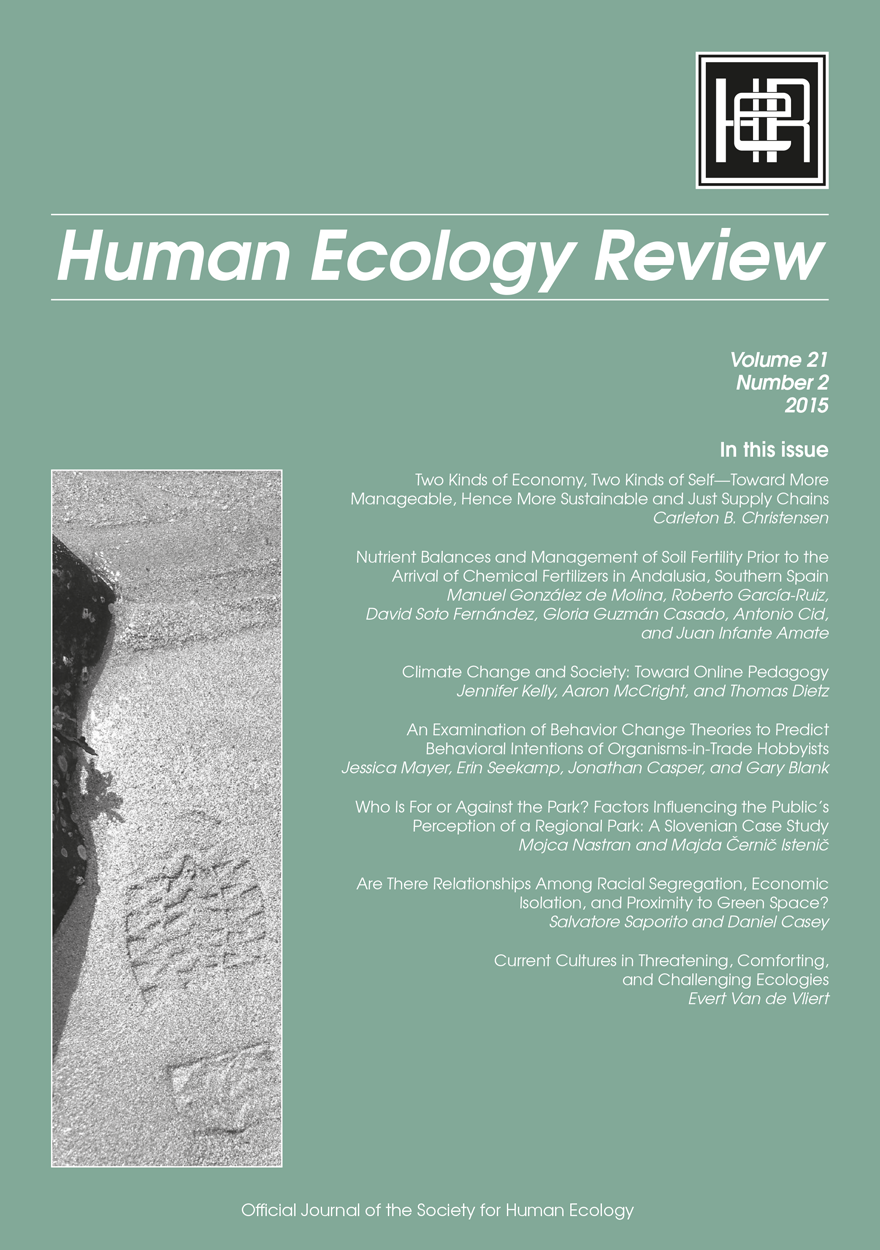
Human Ecology Review: Volume 21, Number 2 »
Publication date: September 2015
Human Ecology Review is a semi-annual journal that publishes peer-reviewed interdisciplinary research on all aspects of human–environment interactions (Research in Human Ecology). The journal also publishes essays, discussion papers, dialogue, and commentary on special topics relevant to human ecology (Human Ecology Forum), book reviews (Contemporary Human Ecology), and letters, announcements, and other items of interest (Human Ecology Bulletin). Human Ecology Review also publishes an occasional paper series in the Philosophy of Human Ecology and Social–Environmental Sustainability.
Download for free
Not available for purchase

A Dissident Liberal »
The Political Writings of Peter Baume
Edited by: John Wanna, Marija Taflaga
Authored by: Peter Baume
Publication date: September 2015
In the ‘broad church’ of the Australian Liberal Party, rarely has there been a maverick so unrelenting in his commitment to personal principles as Senator Peter Baume. Over a parliamentary career spanning 17 years, three ministerial portfolios and five party leaders, Baume was increasingly pitted against his own party room.
In A Dissident Liberal: The Political Writings of Peter Baume, we learn of personal threats, crises, constitutional confrontation and the tension between conservatism and classical liberalism—and between ideology and toeing the party line. This collection of personal observations, speeches and commentaries on contentious policy issues presents a valuable resource for students of Australian political history.
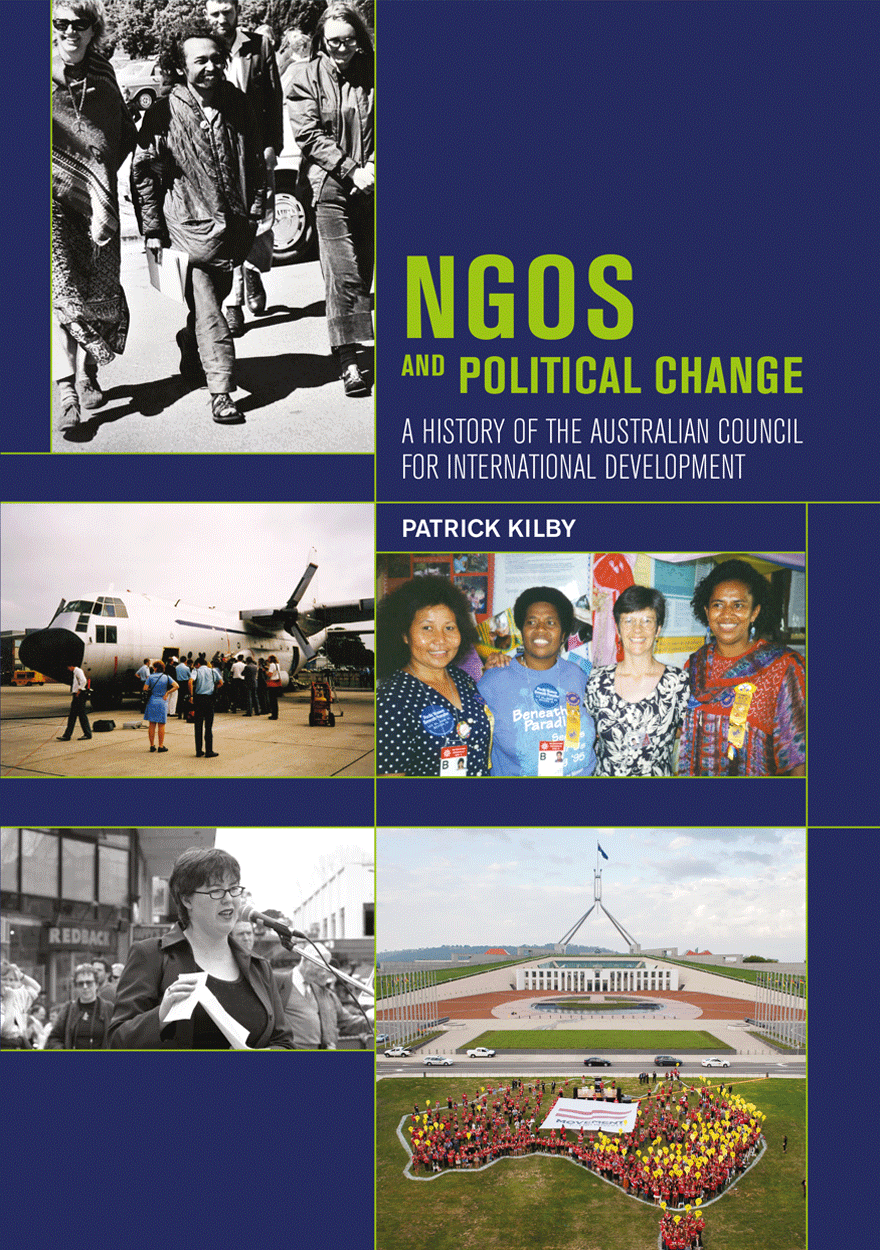
NGOs and Political Change »
A History of the Australian Council for International Development
Authored by: Patrick Kilby
Publication date: August 2015
The Australian Council for International Development is the peak body of Australian international development NGOs. This book explores ACFID’s history since its founding in 1965, drawing on current and contemporary literature as well as extensive archival material. The trends and challenges in international development are seen through the lens of an NGO peak body: from the heady optimism of the first Development Decade of the 1960s, through the growth in government support of NGOs in the 1980s, to the challenges of the 2010s. The major themes of ACFID are presented: human rights; gender justice; humanitarianism; NGO codes of conduct; and influencing government policy both broadly and as it relates to NGOs. Each of these themes is placed in a global context and in relation to what other NGO networks are doing internationally.
ANU Press Journals
Aboriginal History Journal »
Since 1977, the journal Aboriginal History has pioneered interdisciplinary historical studies of Australian Aboriginal people’s and Torres Strait Islander’s interactions with non-Indigenous peoples. It has promoted publication of Indigenous oral traditions, biographies, languages, archival and bibliographic guides, previously unpublished manuscript accounts, critiques of current events, and research and reviews in the fields of anthropology, archaeology, sociology, linguistics, demography, law, geography and cultural, political and economic history.
Aboriginal History Inc. is a publishing organisation based in the Australian Centre for Indigenous History, Research School of Social Sciences, The Australian National University, Canberra.
For more information on Aboriginal History Inc. please visit aboriginalhistory.org.au.
Submission details
Please send article submissions to aboriginal.history@anu.edu.au.
Articles of about 7,000 words in length (including footnotes and references) are preferred, but submissions up to 9,000 words will be considered. Please submit an electronic version of the paper (text only without embedded images or scans) in Microsoft Word or RTF format, along with a short abstract and author biography as a separate document.
ANU Historical Journal II »
The ANU Historical Journal II (ANUHJ II) is an open-access, peer-reviewed academic history journal of the ANU College of Arts and Social Sciences and the ANU College of Asia and the Pacific. It is a revival of the ANU Historical Journal, which was published between 1964 and 1987. Contributors to the first journal included academics such as Ken Inglis, Manning Clark, John Ritchie and Oliver MacDonagh along with then-emerging scholars Iain McCalman, Michael McKernan, Margaret George, Coral Bell, John Iremonger, Alastair Davidson, Susan Magarey and Rosemary Auchmuty. As well as upholding the Journal’s commitment to the work of students and early career researchers, the ANUHJ II has expanded its focus to include memoirs, short articles and long-form book reviews.
The ANUHJ II invites submissions from students, graduates and academics of any Australian university.
For more information about the ANUHJ II, please visit anuhj.com.au
Australian Journal of Biography and History »
The Australian Journal of Biography and History is an initiative of the National Centre of Biography (NCB) in the Research School of Social Sciences at The Australian National University. The NCB was established in 2008 to extend the work of the Australian Dictionary of Biography and to serve as a focus for the study of life writing in Australia, supporting innovative research and writing to the highest standards in the field, nationally and internationally. The Australian Journal of Biography and History seeks to promote the study of biography in Australia. Articles that appear in the journal are lively, engaging and provocative, and are intended to appeal to the current popular and scholarly interest in biography, memoir and autobiography. They recount interesting and telling life stories and engage critically with issues and problems in historiography and life writing.
The journal publishes peer-reviewed articles on Australian historical biography, including biographical studies, studies relating to theory and methodology, and the associated genres of autobiography, life writing, memoir, collective biography and prosopography. We are especially interested in articles that explore the way in which biography and its associated genres can illuminate themes in Australian history, including women in Australian society, family history, transnational networks and mobilities, and Indigenous history.
Submission Details
Please send article submissions or abstracts to the Editor, Dr Malcolm Allbrook, National Centre of Biography, The Australian National University. Email: Malcolm.Allbrook@anu.edu.au. Articles should be in the range of 5,000 to 8,000 words (excluding footnotes), although longer submissions may be considered after consultation with the Editor. Style and referencing: please use footnotes in Chicago style, and follow British spelling.
East Asia Forum Quarterly »
East Asia Forum Quarterly grew out of East Asia Forum (EAF) online, which has developed a reputation for providing a platform for the best in Asian analysis, research and policy comment on the Asia Pacific region in world affairs. EAFQ aims to provide a further window onto research in the leading research institutes in Asia and to provide expert comment on current developments within the region. The East Asia Forum Quarterly, like East Asia Forum online, is an initiative of the East Asia Forum (EAF) and its host organisation, the East Asian Bureau of Economic Research (EABER) in the Crawford School of Public Policy in the ANU College of Asia & the Pacific at The Australian National University.
Submission details
Unsolicited submissions to EAF are welcome. An analytic op-ed piece that is accessible to a general audience and written in crisp language is required. The preferred length of submissions is around 800 words. Submissions will be double-blind reviewed and, if accepted for publication, edited for English fluency and house style before returned for clearance by the author. EAFQ does not use footnotes but would be extremely appreciative if hyperlinks to internet sources are included wherever possible. EAFQ reserves the right to determine the title for any piece, but will not publish a piece or a title without permission. A suggested title is appreciated. If you have any further queries, or would like to submit, please contact shiro.armstrong@anu.edu.au.
Human Ecology Review »
Human Ecology Review is a semi-annual journal that publishes peer-reviewed interdisciplinary research on all aspects of human–environment interactions (Research in Human Ecology). The journal also publishes essays, discussion papers, dialogue, and commentary on special topics relevant to human ecology (Human Ecology Forum), book reviews (Contemporary Human Ecology), and letters, announcements, and other items of interest (Human Ecology Bulletin). Human Ecology Review also publishes an occasional paper series in the Philosophy of Human Ecology and Social–Environmental Sustainability.
Submission details
For information on preparing your manuscript for submission, please visit www.humanecologyreview.org. To submit a manuscript to Human Ecology Review, please visit mstracker.com/submit1.php?jc=her, or email humanecologyreviewjournal@gmail.com.
Humanities Research »
Humanities Research is a peer-reviewed, open access, annual journal that promotes outstanding innovative, interdisciplinary and multidisciplinary scholarship to advance critical knowledge about the human world and society.
The journal is co-published by the Humanities Research Centre, The Australian National University, Canberra. It was launched in 1997 and went into hiatus in 2013. In 2022, the journal is resuming publication, reflecting the continuing strength of the humanities at The Australian National University, the rapid development of the interdisciplinary, environmental and public humanities over the last decade, and the opportunities for international collaboration reflected in the resumption of international travel in 2022.
Issues are thematic with guest editors and address important and timely topics across all branches of the humanities.
International Review of Environmental History »
International Review of Environmental History takes an interdisciplinary and global approach to environmental history. It encourages scholars to think big and to tackle the challenges of writing environmental histories across different methodologies, nations, and time-scales. The journal embraces interdisciplinary, comparative and transnational methods, while still recognising the importance of locality in understanding these global processes.
The journal’s goal is to be read across disciplines, not just within history. It publishes on all thematic and geographic topics of environmental history, but especially encourage articles with perspectives focused on or developed from the southern hemisphere and the ‘global south’.
Submission details
Please send article submissions or abstracts to the Editor, Associate Professor James Beattie, Science in Society, Victoria University of Wellington, PO Box 600, Wellington 6142, New Zealand. Email: james.beattie@vuw.ac.nz.
Abstracts should be no more than 200 words, and include a list of keywords. Articles should be in the range 5,000 to 8,000 words (including footnotes), although longer submissions may be considered after consultation with the editor. Style and referencing: please use footnotes in Chicago Style, follow British spelling, and use single quotation marks only. Find out more details about Chicago Style.
Lilith: A Feminist History Journal »
Lilith: A Feminist History Journal is an annual journal that publishes articles, essays and reviews in all areas of feminist and gender history (not limited to any particular region or time period). In addition to publishing research articles on diverse aspects of gender history, Lilith is also interested in publishing feminist historiographical and methodological essays (which may be shorter in length than typical research articles). Submissions from Australian and international early career researchers and postgraduate students are particularly encouraged.
The journal first began publication in Melbourne in 1984. It is the official journal of the Australian Women’s History Network, an organisation dedicated to promoting research and writing in all fields of women’s, feminist and gender history.
For more information about Lilith, please visit www.auswhn.org.au/lilith/.
Made in China Journal »
The Made in China Journal (MIC) is a publication focusing on labour, civil society and human rights in China. It is founded on the belief that spreading awareness of the complexities and nuances underpinning socioeconomic change in contemporary Chinese society is important, especially considering how in today’s globalised world Chinese labour issues have reverberations that go well beyond national borders. MIC rests on two pillars: the conviction that today, more than ever, it is necessary to bridge the gap between the scholarly community and the general public, and the related belief that open-access publishing is necessary to ethically reappropriate academic research from commercial publishers who restrict the free circulation of ideas.
Discontinued ANU Press Journals
Agenda - A Journal of Policy Analysis and Reform »
Please note: This journal ceased publishing in 2021.
Agenda is a refereed, ECONLIT-indexed and RePEc-listed journal of the College of Business and Economics, The Australian National University. Launched in 1994, Agenda provides a forum for debate on public policy, mainly (but not exclusively) in Australia and New Zealand. It deals largely with economic issues but gives space to social and legal policy and also to the moral and philosophical foundations and implications of policy.
Submission details
Authors are invited to submit articles, notes or book reviews, but are encouraged to discuss their ideas with the Editor beforehand. All manuscripts are subject to a refereeing process. Manuscripts and editorial correspondence should be emailed to: william.coleman@anu.edu.au.
Subscribe to the Agenda Alerting service if you wish to be advised on forthcoming or new issues.
Australian Humanities Review »
Please note: This journal ceased publishing with ANU Press in 2012. Current issues are available at australianhumanitiesreview.org.
Australian Humanities Review is a peer-reviewed interdisciplinary journal featuring articles, essays and reviews focusing on a wide array of topics related to literature, culture, history and politics.
craft + design enquiry »
Please note: This journal ceased publishing in 2015.
craft + design enquiry is an open-access, peer-reviewed journal promoting and disseminating research excellence generated by and about the craft and design sector. craft + design enquiry investigates the contribution that contemporary craft and design makes to society, establishing a dialogue between craft and design practice and cultural, social and environmental concerns. It includes submissions from across the field of craft and design from artists and practitioners, curators, historians, art and cultural theorists, educationalists, museum professionals, philosophers, scientists and others with a stake in the future developments of craft and design.
ANU Student Journals
ANU Undergraduate Research Journal »
Please note: This journal is now published via the ANU Student Journals platform; the latest issues can be found here: studentjournals.anu.edu.au/index.php/aurj
The ANU Undergraduate Research Journal presents outstanding essays taken from ANU undergraduate essay submissions. The breadth and depth of the articles chosen for publication by the editorial team and reviewed by leading ANU academics demonstrates the quality and research potential of the undergraduate talent being nurtured at ANU across a diverse range of fields.
Established in 2008, AURJ was designed to give students a unique opportunity to publish their undergraduate work; it is a peer-reviewed journal managed by a team of postgraduate student editors, with guidance from the staff of the Office of the Dean of Students.
Burgmann Journal - Research Debate Opinion »
Please note: This journal is now published via the ANU Student Journals platform; the latest issues can be found here: studentjournals.anu.edu.au/index.php/burgmann
Burgmann Journal is an interdisciplinary, peer-reviewed publication of collected works of research, debate and opinion from residents and alumni of Burgmann College designed to engage and stimulate the wider community.
Cross-sections, The Bruce Hall Academic Journal »
Please note: This journal is now published via the ANU Student Journals platform; the latest issues can be found here: studentjournals.anu.edu.au/index.php/cs
Representing the combined energies of a large group of authors, editors, artists and researchers associated with Bruce Hall at the ANU, Cross-sections collects a range of works (from academic articles and essays to photography, digital art and installation artwork) that represents the disciplinary breadth and artistic vitality of the ANU.
Presenting a challenging and absorbing way for students to hone vital research skills, in the process, Cross-sections nurtures a fruitful environment of collaborative interaction between academics and students.
Medical Student Journal of Australia »
Please note: This journal ceased publishing in 2015.
The Medical Student Journal of Australia provides the medical school of The Australian National University with a platform for medical students to publish their work in a peer-reviewed journal, communicating the results of medical and health research information clearly, accurately and with appropriate discussion of any limitations or potential bias.
Merici - Ursula Hall Academic Journal »
Please note: This journal is currently not publishing any new issues.
Merici is the combined works of undergraduate authors at Ursula Hall. Merici contains research and analysis from a range of disciplines and is thoroughly reviewed by ANU academics to ensure the showcasing of the best Ursula Hall has to offer.
The Human Voyage: Undergraduate Research in Biological Anthropology »
Please note: This journal is now published via the ANU Student Journals platform; the latest issues can be found here: studentjournals.anu.edu.au/index.php/hv
The Human Voyage: Undergraduate Research in Biological Anthropology is a journal that publishes outstanding student articles in all areas of biological anthropology, including primatology, palaeoanthropology, bioarchaeology and human behavioural ecology.
While the primary goal of this journal is to publish work of the highest quality authored by undergraduate students, it will also educate students in regards to publishing in academia. All submissions will be peer-reviewed and edited by ANU academic staff.





